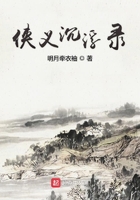Others said, "No, hang it, he is not a milk-sop: he is a tried soldier: he is a sulky beggar all the same." Those under his immediate command were divided in opinion about him.There was something about him they could not understand.Why was his sallow face so stern, so sad? and why with all that was his voice so gentle? somehow the few words that did fall from his mouth were prized.One old soldier used to say, "I would rather have a word from our brigadier than from the commander-in-chief." Others thought he must at some part of his career have pillaged a church, taken the altar-piece, and sold it to a picture-dealer in Paris, or whipped the earrings out of the Madonna's ears, or admitted the female enemy to quarter upon ungenerous conditions: this, or some such crime to which we poor soldiers are liable: and now was committing the mistake of remording himself about it."Always alongside the chaplain, you see!"This cold and silent man had won the heart of the most talkative sergeant in the French army.Sergeant La Croix protested with many oaths that all the best generals of the day had commanded him in turn, and that his present colonel was the first that had succeeded in inspiring him with unlimited confidence."He knows every point of war--this one," said La Croix, "I heard him beg and pray for leave to storm this thundering bastion before it was armed: but no, the old muffs would be wiser than our colonel.So now here we are kept at bay by a place that Julius Caesar and Cannibal wouldn't have made two bites at apiece; no more would I if I was the old boy out there behind the hill." In such terms do sergeants denote commanders-in-chief--at a distance.A voluble sergeant has more influence with the men than the minister of war is perhaps aware: on the whole, the 24th brigade would have followed its gloomy colonel to grim death and a foot farther.One thing gave these men a touch of superstitious reverence for their commander.He seemed to them free from physical weakness.He never SAT DOWN to dinner, and seemed never to sleep.At no hour of the day or night were the sentries safe from his visits.
Very annoying.But, after awhile, it led to keen watchfulness: the more so that the sad and gloomy colonel showed by his manner he appreciated it.Indeed, one night he even opened his marble jaws, and told Sergeant La Croix that a watchful sentry was an important soldier, not to his brigade only, but to the whole army.Judge whether the maxim and the implied encomium did not circulate next morning, with additions.
Sixteenth day of the siege.The round bastion opened fire at eight o'clock, not on the opposing battery, but on the right of the French attack.Its advanced position enabled a portion of its guns to rake these trenches slant-wise: and depressing its guns it made the round shot strike the ground first and ricochet over.
On this our colonel opened on them with all his guns: one of these he served himself.Among his other warlike accomplishments, he was a wonderful shot with a cannon.He showed them capital practice this morning: drove two embrasures into one, and knocked about a ton of masonry off the parapet.Then taking advantage of this, he served two of his guns with grape, and swept the enemy off the top of the bastion, and kept it clear.He made it so hot they could not work the upper guns.Then they turned the other two tiers all upon him, and at it both sides went ding, dong, till the guns were too hot to be worked.So then Sergeant La Croix popped his head up from the battery, and showed the enemy a great white plate.This was meant to convey to them an invitation to dine with the French army:
the other side of the table of course.
To the credit of Prussian intelligence be it recorded, that this pantomimic hint was at once taken and both sides went to dinner.
The fighting colonel, however, remained in the battery, and kept a detachment of his gunners employed cooling the guns and repairing the touch-holes.He ordered his two cutlets and his glass of water into the battery.
Meantime, the enemy fired a single gun at long intervals, as much as to say, "We had the last word."Let trenches be cut ever so artfully, there will be a little space exposed here and there at the angles.These spaces the men are ordered to avoid, or whip quickly across them into cover.
Now the enemy had just got the range of one of these places with their solitary gun, and had already dropped a couple of shot right on to it.A camp follower with a tray, two cutlets, and a glass of water, came to this open space just as a puff of white smoke burst from the bastion.Instead of instantly seeking shelter till the shot had struck, he, in his inexperience, thought the shot must have struck, and all danger be over.He stayed there mooning instead of pelting under cover: the shot (eighteen-pound) struck him right on the breast, knocked him into spilikins, and sent the mutton cutlets flying.
The human fragments lay quiet, ten yards off.But a soldier that was eating his dinner kicked it over, and jumped up at the side of "Death's Alley" (as it was christened next minute), and danced and yelled with pain.
"Haw! haw! haw!" roared a soldier from the other side of the alley.
"What is that?" cried Sergeant La Croix."What do you laugh at, Private Cadel?" said he sternly, for, though he was too far in the trench to see, he had heard that horrible sound a soldier knows from every other, the "thud" of a round shot striking man or horse.
"Sergeant," said Cadel, respectfully, "I laugh to see Private Dard, that got the wind of the shot, dance and sing, when the man that got the shot itself does not say a word.""The wind of the shot, you rascal!" roared Private Dard: "look here!" and he showed the blood running down his face.
The shot had actually driven a splinter of bone out of the sutler into Dard's temple.
"I am the unluckiest fellow in the army," remonstrated Dard: and he stamped in a circle.















